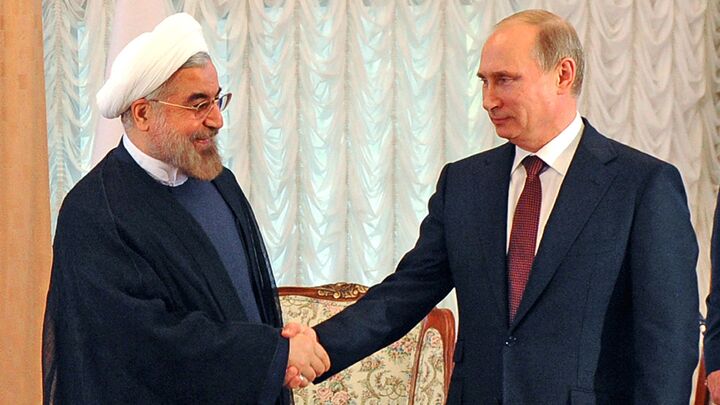
Russian Trade to Empower Iran
Upcoming nuclear negotiations are being threatened by an oil-for-goods deal between Russia and Iran. The deal severely undermines the current sanctions on Iranian oil, granting Iran major pressure relief and strengthening its negotiating position.
In exchange for undisclosed goods and equipment, Iran will sell Russia an estimated 500,000 barrels of crude oil per day. The deal emphasizes Russia’s foreign policy of constant opposition to Western policies, particularly in the Middle East. It also shows that while sanctions did have Iran in a tight position, the notion of now threatening Iran with more sanctions may be futile.
Good for Iran
U.S. and European sanctions had cut Iran’s oil exports by more than half over the past 18 months to roughly one million barrels a day. It was these heavy sanctions that helped draw Iran to the negotiating table in November. With its economy being pushed to the brink, Iran needed a deal that would lighten its economic burdens—or its economy would collapse.
The West has repeatedly employed sanctions when dealing with Iran, but more and more often, Iran is finding its way around them.
Russian purchases of 500,000 barrels of Iranian crude oil per day would increase Iran’s oil exports by 50 percent and provide a major boost to its struggling economy. It would negate many of the sanctions the U.S. and Europe have been using to keep Iran in check. With current oil prices near $100 a barrel, Iran would earn about an additional $1.5 billion a month from the oil-for-goods deal.
While the amount is small compared to Iran’s budget of $36.25 billion per month last year, it is substantial when compared to the recent sanctions deal. Iran will receive $4 billion over the next six months because of the first Geneva deal. If Iran fought so hard to gain that amount in Geneva, gaining $9 billion from Russia over that period is significant. In a year, Iran will be raking in an extra $18 billion on top of sanctions relief.
The diplomatic implications are immense. If Iran is earning an extra $1.5 billion per month by selling oil to Russia, it has much less to fear from U.S. and European sanctions. Suddenly Iran isn’t being forced into any decisions at the negotiating table, and can more readily afford simply walking away and accepting the consequences from the West.
Good for Russia
The benefits of the deal are obvious for Iran. But what does the deal give Moscow? Russia is the largest oil exporter in the world, so on the surface, the move might not seem to make sense. What does Russia need with Iranian oil?
On January 2, the Russian energy ministry released data showing that the country’s oil output had risen to a post-Soviet high of 10.51 million barrels per day in 2013, up almost 1.4 percent from 2012. Almost all large Russian oil firms increased output in 2013 as they boosted drilling. Even Lukoil, Russia’s second-largest oil producer and top non-state oil company increased output, despite logging declines in the previous three years. Russia has no need to buy oil off anyone. It is the equivalent of Cuba importing cigars.
But the move is quite financially savvy for Russia. Russia will undoubtedly resell the Iranian oil, so it will regain most, if not all of its cost. More importantly, it will get to dictate where the oil goes. In other words, Russia plays the role of a middle man for an even greater portion of the world’s oil supply. It is ironic that the oil may even find its way to Europe, which is currently sanctioning Iranian oil.
Russia is competing with the U.S. for dominance in the Middle East. Buying the oil empowers Iran ahead of the Geneva 2 talks. Iran is Russia’s key ally in the Middle East and serves as the main counter to American influence. Iran exports terrorists, funds coups, incites sectarian conflicts and zealously undermines the interests of America and its allies. This all plays into Russia’s broader goals, which it has held since the days of the cold war.
Russia’s antagonism with the West is also obvious in Syria, where Moscow has stepped into the lead role with the disarmament process. Russia is also building ties with Egypt, until recently a key U.S. ally. Russia is building its presence in the region.
Russia’s deal with Iran is designed to strengthen Tehran’s negotiating position, which in turn weakens its opponents, the United States and Europe.
Bad for the U.S. and Europe
If the deal goes ahead, Iran will be far less concerned with the threat of looming sanctions at the end of the current six-month deal. The U.S. and Europe may soon find Iran more willing to walk away from the negotiating table, or face more pointless and frustrating delay tactics.
If Iran does remain in negotiations, it will have a far stronger position than it had during the first Geneva talks. It would have less to lose from walking away than would the U.S. and Europe, which would then face having to address the military option or live with a nuclear Iran.
The tension in the Middle East is growing, alliances are forming and the balance of power is shifting. When observed carefully, these geopolitical shifts run right in line with Bible prophecy. Many of the events unfolding today were prophesied thousands of years ago. The Trumpet explains many of these news events and their biblical origins as they unfold. Request a free copy of our booklets The King of the South and The History and Prophecy of the Middle East for more understanding of the earthshaking current events in the Mideast.
